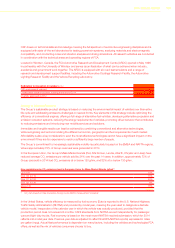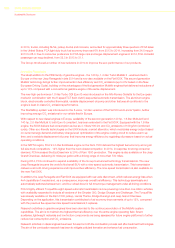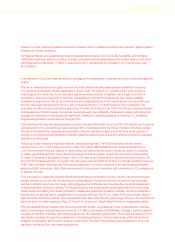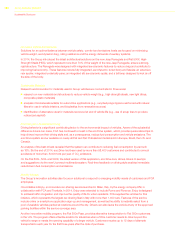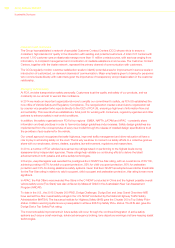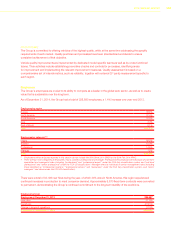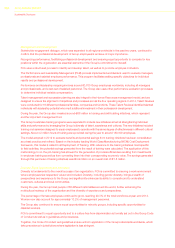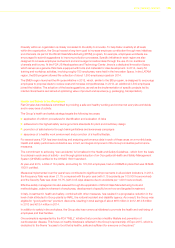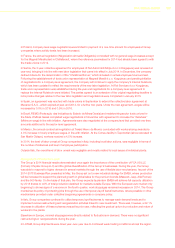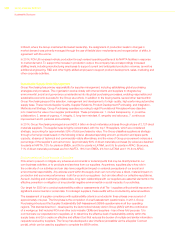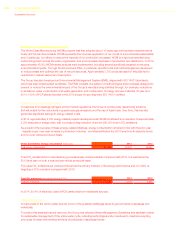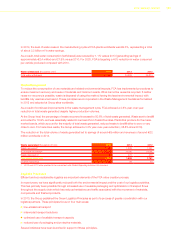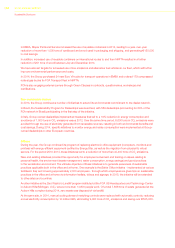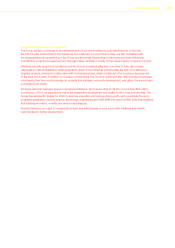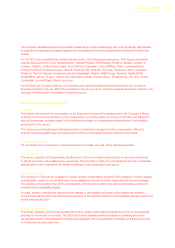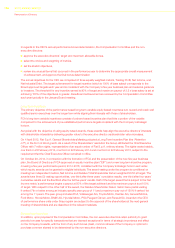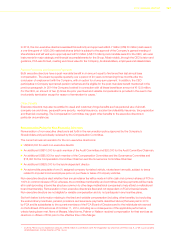Chrysler 2014 Annual Report Download - page 129
Download and view the complete annual report
Please find page 129 of the 2014 Chrysler annual report below. You can navigate through the pages in the report by either clicking on the pages listed below, or by using the keyword search tool below to find specific information within the annual report.
2014 | ANNUAL REPORT 127
In Poland, company-level wage negotiations were limited to payment of a one-time amount for employees at Group
companies where activity levels had been increased.
In France, the annual negotiation (Négociation Annuelle Obligatoire) concluded with no general wage increases except
for the Magneti Marelli plant in Châtellerault, where the reference parameters for 2014 had already been agreed to with
the trade unions in 2012.
In Serbia, the 3-year collective agreement for employees of Fiat Automobili Srbija d.o.o in Kragujevaç was renewed at
year end, bringing it into line with new labor legislation that came into effect in July 2014. In December, the company
defined criteria for the determination of the “Christmas Bonus,” which is based on actual employee hours worked.
Following the establishment of trade union representation at Magneti Marelli d.o.o. Kragujevac and pending initiation
of negotiations for a company-level agreement, the company will continue to apply the company’s Internal Rulebook,
which has been updated to reflect the requirements of the new labor legislation. At Fiat Services d.o.o Kragujevac,
trade union representation was established during the year and negotiations for a company-level agreement to
replace the Internal Rulebook were initiated. The parties agreed to an extension of the original negotiating deadline to
incorporate changes relative to the new labor legislation and negotiations were completed in January 2015.
In Spain, an agreement was reached with trade unions in September to extend the collective labor agreement at
Mecaner S.A.U., which expired at year-end 2014, for a further two years. Under the new agreement, wages will be
increased by 0.5% in 2015 and 0.9% in 2016.
In Brazil, FIEMG (Federação das Indústrias do Estado de Minas Gerais) and metalworking sector trade unions for
the State of Minas Gerais completed wage negotiations in November with agreement to increase the “database”
(Minimum wage) in line with inflation. Agreements were also negotiated at the company level that provided one-time
amounts additional to the sector-level agreement.
In Mexico, the annual contractual negotiation at Teksid Hierro de Mexico concluded with workers being awarded a
4.3% increase in hourly employee wages, in line with inflation. At the Comau facility in Tepotzotlan (since relocated to
San Martin Obispo), workers received a 4.5% increase.
In 2014, the level of labor unrest at Group companies in Italy, including local labor actions, was negligible in terms of
the number of instances and level of employee participation.
Outside Italy, the overall level of labor unrest was negligible and mostly related to local issues at individual plants.
Management of Production Levels
The Group’s 2014 financial results demonstrated once again the importance of the contribution of FCA US LLC
(formerly Chrysler Group LLC) and the global diversification of the Group’s businesses. During the year, the Group
was able to respond to higher demand in several markets through the use of flexible labor mechanisms. As part of the
2014-2018 Business Plan presented in May, the Group set out a new industrial strategy for EMEA, where production
will be increased to support the planned growth in global sales for the premium brands (Maserati, Jeep, Alfa Romeo)
and the 500 family. On the basis of that plan, the Group expects its plants in EMEA will achieve full capacity utilization
by 2018 thanks to 40% of total production destined for markets outside Europe. With the European auto market only
beginning to shows signs of a recovery in the fourth quarter, work stoppages remained necessary in 2014. The Group
maintained its policy of protecting jobs through the use of temporary layoff benefit schemes, where possible or other
mechanisms provided under collective bargaining agreements or company policy.
In Italy, Group companies continued to utilize temporary layoff schemes to manage weak demand levels and to
implement various restructuring and reorganization activities linked to new investment. There was, however, a 22.1%
decrease in utilization of these schemes versus the prior year, reflecting the gradual upturn in production and return of
workers to the plants.
Elsewhere in Europe, minimal stoppages were directly related to fluctuations in demand. There were no significant
restructurings or reorganizations during the year.
In LATAM, Group shipments were down year-over-year due to continued weak trading conditions across the region.


